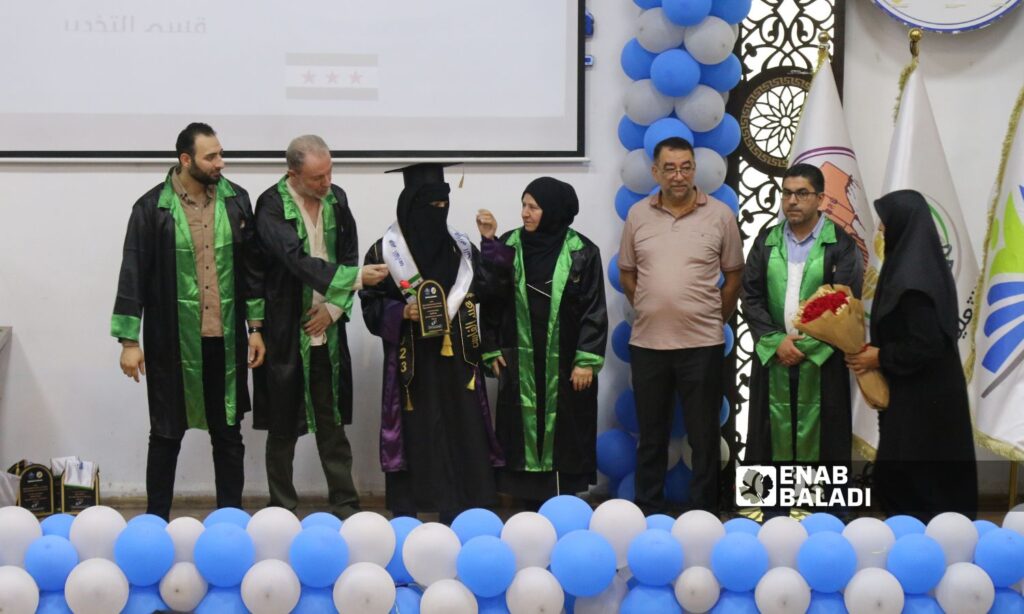Azaz – Dayan Junpaz
The Free Aleppo University in the city of Azaz in the northern countryside of Aleppo announced the graduation of hundreds of students in the academic year 2022-2023. The university held a graduation ceremony from July 14 to 23 this year, according to specializations and departments.
However, these graduation celebrations are met with the graduates’ challenges and hopes of securing job opportunities that match their specializations.
The director of the university’s media office, Nassar Nassar, told Enab Baladi that the total number of graduates reached 1,250 students from various specializations, including medical colleges, literature, economics, education, law, Islamic studies, along with political science, engineering, and technical medical and media institutes, and information technology.
He added that the College of Law and the Technical Institute for Business Administration had the most graduates.
Scarcity of job opportunities
Many graduates, whom Enab Baladi interviewed, face difficulties in finding job opportunities commensurate with their academic specializations, first citing the high number of graduates.
Some seek to develop their skills through further studies or by joining various training programs, hoping to increase their chances in the job market.
Often, the available opportunities for graduates are far from their academic specializations, making it difficult to find jobs that match their qualifications.
Amjad Orabi, a graduate of the Technical Institute for Media, began searching for job vacancies at media agencies and local organizations but has not yet been able to find a suitable position.
Orabi told Enab Baladi that the lack of job opportunities pushed him towards studies in computer science, to increase his practical experience in several fields, and increase his chance of acceptance in the job market.
He added that he filled out many application forms for job vacancies online but has not received any responses, pointing out that graduates’ available options are usually limited to volunteer work.
Orabi hopes to find a job opportunity in the near future, aiming to integrate into the job market and develop his skills in his professional field, according to him.
On the other hand, Ummayma Ayeto, a graduate of the College of Law, was compelled to work as a paramedic with the Syria Civil Defence team from the beginning of her university studies. She noted that this job was not her preferred choice but a necessity due to the living conditions, according to her.
Ayeto told Enab Baladi that her options are limited after graduation and that she will continue her current work until a job opportunity within her specialization arises.
She pointed out that joining the Bar Association and passing a two-year training period is the only option to start her specialization after graduation, noting that she has taken this step.
She explained that job opportunities are scarce in her field of specialization, pointing out that society does not give enough attention to the legal profession as a career option for women, negatively affecting their chances of getting job opportunities.
Ayeto expressed her confidence in her ability and that of her colleagues to prove themselves in this field, affirming her determination to support the idea that law is a profession suitable for everyone, regardless of gender.
11,000 students
University students in northwestern Syria face difficulties and obstacles that weigh on them and make studying a burden, from housing rent to high transportation costs and the lack of job opportunities.
The Free Aleppo University is one of the most prominent universities in the region, established in 2015. It is an official educational institution affiliated with the Higher Education Council of the Syrian Interim Government, based in Azaz.
The university includes about 11,000 students, distributed across 16 colleges and 7 institutes, with the colleges of human medicine, pharmacy, and health sciences in the city of Marea, and the rest of the colleges and institutes in the city of Azaz, according to the director of the media office, Nassar Nassar.
Around 19 universities, both private and public, are spread across northwestern Syria, alongside many institutes, with Free Aleppo University being the largest among them.











